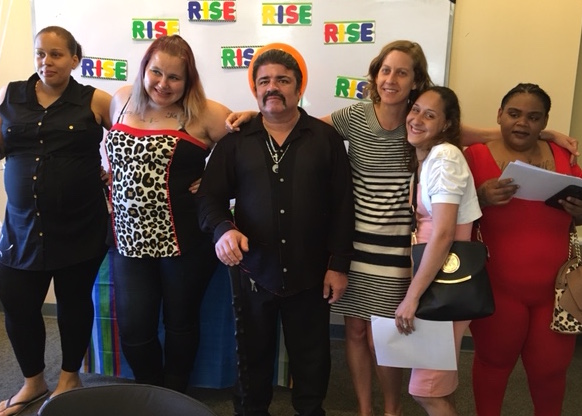
Interview with Jess Dannhauser, President and CEO
Graham Windham is a child welfare and youth development agency in New York City. A few years ago we sat down and talked about what we could do to further our support for parents. When we started to talk with parents about what they value, they said they valued their relationships with peers.
We thought that a Rise writing group for parents with children in foster care could add to our peer work, and we wanted to learn from the experiences of the parents that we serve. So for the past two years, Rise has run a writing group here at Graham.
Writing Without Fear
Through the Rise stories, we’ve gotten to genuinely meet a lot of our parents. During a court case, parents have to be careful about making the right moves and telling the right story. Rise’s writing process allows parents to go beyond that. It gives parents the gift to think through their narrative, who they are, and how they came to where they are today.
Reading the stories, it can look like someone has divulged their heart, and you don’t know if they regret that or not. But one of the unseen values about Rise is that the writing process helps parents set their own boundaries. It helps them make careful choices about what they’re willing to share and be authentic to the choices they want to make. It’s extraordinary—and I’m proud—that the parents could feel safe enough to share their stories in the Rise group while their children were still in our care.
Important Reminders
At Graham, the Rise stories have been a reminder that parents come to us in moments of crisis that have a long history, and we have to see our work as one piece of that thread. When someone comes in the door, it’s not a cookie cutter situation. We have to see how complex their lives are. Parents are contending with financial, emotional and social challenges that would get the best of any of us.
The stories also have been a reminder of the power and influence you have as a professional in child welfare. It’s very easy to lose sight of that. To see in the stories how powerfully a phrase can stick in a parent’s mind is a reminder of the profound work we do and how carefully we have to do it. Knowing that encouraging words can help change a life for the better, and that negative words, even said unintentionally, can change it for the worse, is an awesome responsibility.
Listening Past Defensiveness
Reading the stories, there’ve been painful moments when I want to say, “That’s not the whole story!” The safest thing is to try to wipe it to the side. I have to remind myself that it doesn’t really matter if it’s the full story or not; it’s true to that person’s experience. Our work is to make their experience feel respectful and be effective.
When I can put aside defensiveness and not allow the voice in my head to contradict the story in order to make myself feel better, I often see that it’s not some enormous policy or practice change we need to make, but that child welfare really needs to get better at being able to hear and see people. There’s an enormous value in feeling understood.
Our goal at Graham is to become a community where people feel comfortable. That’s hard to do. We have more to do to listen. The parents’ stories are a window into how we should be listening to everybody. They remind us to slow down for a second and say, “Wait, there’s a whole story here.”
Honoring Parents
The Rise graduation was a fabulous moment. The parents read their stories, their families came out, and our staff listened and ate dinner with them. For our staff, it helped us be so much more aware of the full context of our parents’ lives. Their children also saw their parents accomplish something important and saw that their parents were worthy of the esteem.
The graduation refreshed us and reminded us of why we do this work. When I watched a parent graduate from the program and hug her daughter, I was reminded that this child has a deep relationship with her mom that is always going to be really important to her. We don’t know if this parent is going to get her child back. But for this child, her mom is always going to be her mom, and she is going to remember seeing her mom honored.
